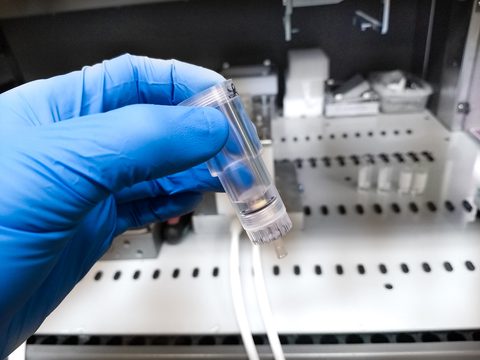

Dramatically Improving Enzyme Recovery using Ultra-Scale Down Techniques
Optimisation of downstream processing is just as important as optimising the fermentation process itself to increase the recovery of the enzyme.
OVERVIEW
During an enzyme development project for a customer, we were faced with a challenge to overcome. After identifying the optimal gene sequence, small quantities of the enzyme needed to be produced for customer acceptance testing using lab scale fermentation. It was determined that the downstream processing did not provide enzyme at a level that was commercially viable. If this process could not be improved, the project would be cancelled.
PROJECT CHALLENGE
Downstream processing (DSP) is a key part of the enzyme manufacturing process that occurs after fermentation. Optimising the DSP is just as important as optimising the fermentation process and the correct parameters for DSP are often unique to each enzyme.
For this project the challenge was to find a process that could be used to increase the (post fermentation) recovery of the enzyme without causing adverse changes to the enzyme properties i.e. reduced activity and stability. Also, any additional processing needed to be food grade, kosher and halal compatible.
APPROACH
The first step was to establish what was happening to the enzyme during primary recovery – was the enzyme being denatured or precipitating out? Once it was identified that the enzyme was precipitating out, we knew we needed to explore possible options to keep it in solution for further downstream processing.
Biocatalysts’ Capabilities Team identified a set of possible solutions that could resolve the problem and, in conjunction with University College London (UCL), developed an ultra-scale down platform to test these solutions.
Utilising ultra-scale down techniques gives the ability to mimic large-scale operations and allow for scrutinisation of the effects of different conditions, for instance varying pH, temperature, microbial strain or buffer chemistry. As these scale-down trials operate on a much smaller scale they can be run relatively quickly in a cost-effective way. Thereby maximising the probability of achieving optimal results first-time during scale up.
In this case, using the ultra-scale down technology meant that several combinations of chemicals and concentrations could be tested to find an optimal process.
For more information on ultra-scale technology visit UCL’s website – http://www.ucl.ac.uk/biochemeng/research/ultra-scale-down
OUTCOME
Within three weeks of identifying the cause of low enzyme recovery, the ultra-scale down testing provided a process that precipitated most impurities whilst keeping the enzyme of interest in solution. This meant that recovery of the enzyme increased dramatically by 300% and most importantly meant that the development project was economically viable and was subsequently scaled-up to a commercial manufacturing process.
BENEFITS
- Ability to test a number of parameters quickly and cost effectively
- Reduce time to commercialise enzyme
- Product optimisation throughout the whole manufacturing process – meeting enzyme pricing target
- Consistent quality
[Update 11.02.2021]
This projects novel approach to using Ultra Scale-down technology to resolve recovery issues and accelerate the industrial manufacture of a novel enzyme has been recognised by the prestigious IChemE Global awards. It was recognised that the economic benefits of the improved enzyme manufacturing process will enable more customers to access Biocatalysts Ltd’s enzyme products and therefore gain the advantage of using enzyme-based processes.